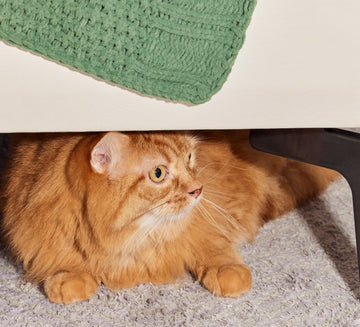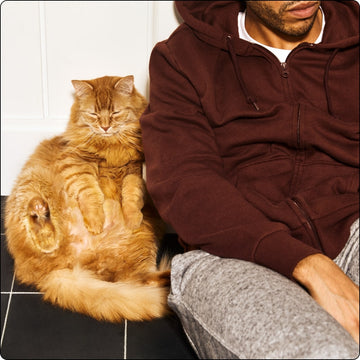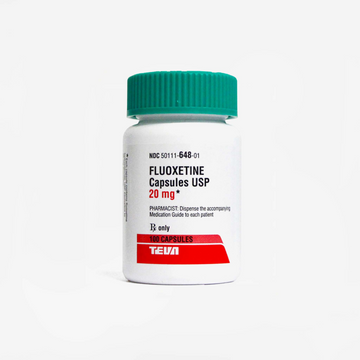Skip the stress of a vet visit — treat your cat's anxiety from home.
Video chat with a vet today to get prescription medication mailed to you. Plans start at $11/mo.

- Unlimited video calls & messaging
- Same-day, night & weekend appointments
- Prescriptions delivered free to you
- Our vets can treat 93% of anxiety issues

What does cat anxiety look like?
Even though cats can’t talk, their behaviors tell us when there’s an issue


Hiding
Hiding
If your cat spends most of the time hidden under a bed or out of sight from the other people, dogs, cats, Roombas, etc. — it may be a sign of anxiety. At Dutch, we make sure to treat anxiety like the medical problem it is, to provide your cat lasting relief.
Fear of new places/people
Fear of new places/people
If your cat isn’t a fan of going to new places or meeting strangers, fear or anxiety could be the underlying cause of their timid behavior. Our Dutch-affiliated vets will review their list of triggers and fears to develop a plan that will get to the root of your cat’s problems and create lasting change.
Fear of being alone
Fear of being alone
Sure, it’s cute when your cat wants to be by your side all day long, but do you know how to recognize signs of their clinginess veering into separation anxiety territory? Our panel of experts do. There are only 80 vet behaviorists in the entire country and at Dutch, we work with two of them to develop medication protocols to calm your cat’s anxious brain.
Meowing or yowling
Meowing or yowling
Excessive meowing and/or yelling is a cry for help and a major sign of cat anxiety, and shouldn’t be ignored. At Dutch, we know that medication alone isn’t the answer. Once medications help calm the anxious brain, our pets are more receptive to training. We’ll give you the tools to implement easy-to-learn training exercises, plus environmental enrichment techniques, to create lasting change in your cat’s day-to-day life.
Destructive behavior
Destructive behavior
Can’t leave the house because your cat will tear up anything in their path? Destructive behavior is a common sign of a distressed, anxious cat. Our online consultation will help us understand your cat’s triggers and symptoms so we can begin to develop their customized anxiety treatment plan. Still have questions? Our experts will get back to you with answers within 24 hours, every time.
Urinating outside of the litter box
Urinating outside of the litter box
Did you find your shoes filled with something other than insoles? Was there an unwelcome present left in the middle of your bed? Anxiety or stress can be one cause of your cat eliminating outside of the litter box and our team of vets can help you relieve their stress so they relieve themselves where they should.
How Dutch works
-
Pick a plan and become a member
-
Schedule a video call with a licensed vet
-
Order the prescriptions the vet recommends
Frequently asked questions
What can I use Dutch for?
What can I use Dutch for?
With Dutch, you’re never alone when it comes to your pet’s health. Whether your pet needs care or you just have a question, our compassionate and knowledgeable vets are always happy to help.
Here are some ways you can use Dutch:
- Care & prescriptions for over 150 issues
- Behavioral health, nutrition, and exercise advice
- Puppy, kitten, and new pet parent advice
- Preventive care plans
- Night and weekend vet care
- Second opinions & follow-up care after in-person visits
- Advice on whether you need to go to the ER or urgent care
- Vet care when you’re traveling
- Easy prescription refills
- Longevity treatment plans
- Answers to non-urgent questions
What is a visit with Dutch like?
What is a visit with Dutch like?
When booking a video call with a vet, you'll be asked a few questions about your pet’s health issue. Depending on the issue, you may also be asked to fill out a longer questionnaire about their symptoms and share photographs of them so our veterinarians can better understand what’s going on. You’ll then pick an appointment time that works best for you.
During your video call, one of our licensed veterinarians will talk to you about the symptoms your pet is experiencing, ask you questions, review your pet’s medical history if you’ve provided it, and answer any questions you have. The vet will ask to see your pet and their environment. And they may ask you to perform some simple checks on them if needed.
After your video call, the vet will send you a message with a custom treatment plan to help your pet feel better, including a link to buy any recommended prescription or over-the-counter medications. Place your order and we’ll ship it free.
How do I know if you can treat my pet?
How do I know if you can treat my pet?
Our vets can provide care and prescriptions for more than 150 issues — and over 90% of cases can be treated virtually.
The vet can diagnose your pet based on your description of their symptoms, their medical history, seeing them during your video call, and, if needed, through uploaded photos and videos. They may ask you to do a few simple checks during the call. We also offer a number of at-home lab test kits for dogs and cats.
The health and safety of pets is our top priority. In the rare case that a vet determines a pet needs to go to a local clinic, they’ll provide a referral and offer advice on how to care for them until they can be seen.
Some things that require in-person care include emergencies, wounds that need stitches, and issues that require blood work, imaging (X-rays or ultrasounds), or surgery.
Our vets are always available for second opinions and follow-up care after in-person vet visits — so you don’t have to navigate health issues alone.
How much will it cost for Dutch to treat my pet?
How much will it cost for Dutch to treat my pet?
Our memberships are designed to make your pet’s care as easy and affordable as possible. Here’s how your costs will break down:
Membership: You can choose to pay the total price upfront or in 4 installments. All memberships include unlimited care for up to 5 pets at no extra cost.
Vet calls and messaging: No cost — video chat and message with vets as often as you need for free.
Medication: The price will vary depending on your pet’s needs. To keep your costs down, we offer a price-match guarantee, free standard shipping, $25 off your first product order, and 20% off your first flea & tick order.
How does Dutch pet allergy treatment work?
How does Dutch pet allergy treatment work?
Based on the results of the online consultation and the diagnosis made, the Dutch-affiliated veterinarian will recommend certain medications and therapies to stop the itch and improve the overall health of the skin. The goal is to prevent further trauma to the skin in the short term by allowing it to heal, then preventing itch in the long term by getting to the root cause of the problem that is driving the itch response.




















